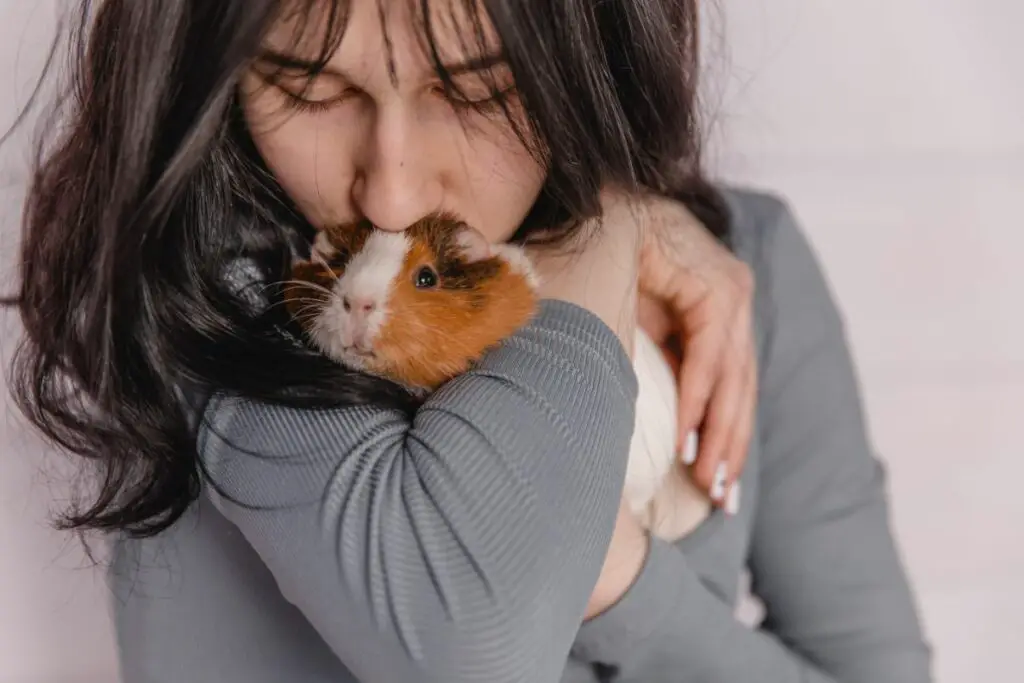Guinea pigs are adorable and charming pets that are easy to keep and care for. However, they have specific water needs that must be met to keep them healthy and happy.
Water is an essential nutrient for guinea pigs as it helps them digest their food and maintain their body temperature. It also helps to keep their skin and coat healthy and helps them flush out toxins from their bodies.

How much water should a guinea pig drink?
An adult guinea pig should drink approximately 100-150 ml of water every day. This amount may vary based on the size, age, and activity level of the guinea pig.
What are the signs of dehydration in guinea pigs?
It’s essential to monitor your guinea pig’s water intake and look out for signs of dehydration. Some of the most common signs of dehydration in guinea pigs include:
- Lethargy
- Dry skin
- Sunken eyes
- Loss of appetite
- Weight loss
- Sticky or dry mouth
What are the consequences of not providing enough water?
Not providing enough water to your guinea pig can lead to health issues such as constipation, bladder stones, and urinary tract infections. It can also cause dehydration, which can be fatal if not treated promptly.
Reasons Your Guinea Pig Might Be Drinking More Water
If you notice that your guinea pig is drinking more water than usual, it could be a sign of an underlying health issue. Here are some of the common reasons why your guinea pig might be drinking more water:
Illnesses that increase water intake
Guinea pigs that have underlying health issues such as diabetes or kidney disease may drink more water than usual. If you suspect that your guinea pig is ill, it’s crucial to take them to a veterinarian for a check-up.
Physical activity and temperature changes impacting water consumption
Guinea pigs that are more active or live in warmer temperatures may drink more water than usual to stay hydrated. Ensure that your guinea pig has access to fresh and clean water at all times.
Age-related changes in water intake
As guinea pigs age, their water needs may change. Some older guinea pigs may drink more water than usual due to age-related health issues. If you notice any changes in your guinea pig’s water intake, it’s crucial to consult with a veterinarian.
How to Promote Proper Hydration for Your Guinea Pig
It’s essential to ensure that your guinea pig has access to clean and fresh water at all times. Here are some tips on how to promote proper hydration for your guinea pig:
Choosing the right water bottle or bowl
Choose a water bottle or bowl that is easy to clean and refill. Ensure that the water is fresh and clean at all times.
Ensuring clean and fresh water supply
Clean your guinea pig’s water bottle or bowl regularly to prevent the growth of bacteria. Refill the water bottle or bowl with fresh water daily.
Providing moisture-rich foods to supplement water intake
Guinea pigs love to eat fruits and vegetables that are high in water content. Consider offering your guinea pig foods such as cucumber, watermelon, or lettuce to supplement their water intake.
When to Seek Veterinary Help
If you notice any signs of dehydration in your guinea pig, it’s crucial to seek veterinary help promptly. Your veterinarian can diagnose the underlying cause of the excessive water intake and provide appropriate treatment. Remember, early diagnosis and treatment can help prevent serious health issues in your guinea pig.
What to do if your guinea pig is showing signs of dehydration
If you suspect that your guinea pig is dehydrated, offer them fresh water immediately. You can also offer them fluids such as Pedialyte to help rehydrate them. If your guinea pig does not improve, take them to a veterinarian for a check-up.
How a veterinarian can help diagnose and treat excessive water consumption
A veterinarian can perform a physical exam, blood tests, and urine tests to diagnose the underlying cause of excessive water intake. They can also provide appropriate treatment, such as medications or dietary changes, to help manage the condition. Regular veterinary check-ups can help prevent serious health issues in your guinea pig.
Conclusion
In conclusion, understanding your guinea pig’s water needs is essential for their health and well-being. Ensure that your guinea pig has access to clean and fresh water at all times and monitor their water intake regularly. If you notice any changes in your guinea pig’s water intake, seek veterinary help promptly. With proper care and attention, your guinea pig can live a long and healthy life.
- How Long Do American Eskimo Dogs Live? Important Factors and Care Tips - September 29, 2023
- Do American Bulldogs Need Grooming? Essential Tips and Care Guidelines - September 29, 2023
- Do Bengal Cats Enjoy Playing? Essential Tips for Keeping Them Active - September 29, 2023